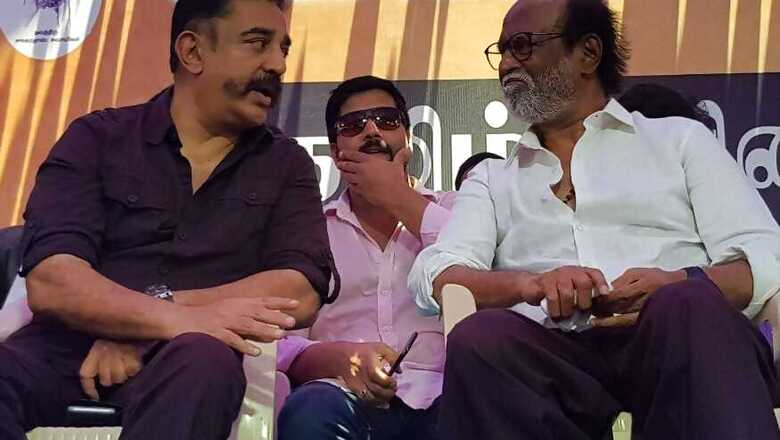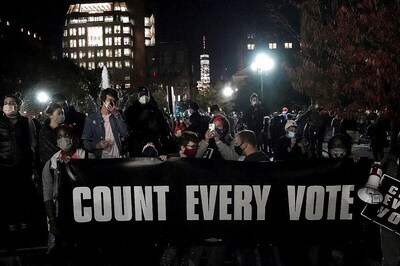
views
Rajinikanth and Kamal Haasan who claim to have entered politics to change and clean it are acting like parochial politicians.
Prof MK Surappa, former director of IIT Ropar and newly appointed vice-chancellor of Anna University in Chennai, has nothing to do with the Cauvery dispute between Tamil Nadu and Karnataka. But Tamil politicians, including those like Kamal Haasan and Rajinikanth who claim to have entered politics to change and clean it, have now made Surappa a soft target.
The only reason he is being targeted is because his mother tongue is Kannada and he has been chosen to head a prestigious university in Tamil Nadu. Unfortunately, even Rajinikanth, who has had to fiercely fight Tamil groups on attacks over his origins in Karnataka, has lent his voice to the clamour against Surappa’s appointment.
Protesting against the Cauvery issue is one thing, but turning it into a battle between linguistic identities is quite another and it has been done by political parties in both states, purely for electoral advantage.
Making an innocent academic the target of attack, because he is Kannada speaking, only suggests that both Kamal Haasan and Rajinikanth are acting like conventional politicians, not willing to challenge the core of manipulative identity politics. Such politics will only dent their credibility and leave the Cauvery dispute unresolved. They may have to acknowledge that a change in politics also involves a change in the way political parties manipulate the electorate by reducing the substance of the debate with unpardonable rhetoric.
It is this manipulative identity politics and linguistic chauvinism in Karnataka and Tamil Nadu that has ensured that no negotiated, mature, politically acceptable solution is possible for the Cauvery dispute between the two states.
Firstly, it is a deficit river and cannot satisfy the needs of all riparian states completely even in a normal year. Secondly, there is little or no effort to readjust and seriously rework cropping patterns in both states to adapt to changing demands from the river. Thirdly, reliance on the river is only increasing with each passing year as groundwater sources are depleting.
In this backdrop, there is no other institution but the Supreme Court that can settle this dispute and even the SC has often found it difficult to implement decisions or orders passed by it in a dispute year. For instance, in 2016 Karnataka failed to implement the court’s orders to release water to Tamil Nadu and instead passed a resolution in the state legislature against such a release.
It is precisely this inability to ensure that a fair settlement is implemented and water is released in time for standing crop that a Cauvery Management Board (CMB) was ordered by the apex court.
As the upper riparian state, Karnataka has opposed the formation of such a board as it fears that it will lose control over the sluice gates of large dams like Krishna Raja Sagar dam, and be forced to release water. With elections just a few days away, the central government led by the BJP, which hopes to wrest Karnataka from the Congress, is not setting up a management board as it could prove costly in Karnataka. Instead, it has suggested an advisory committee.
Tamil Nadu fears that without a Cauvery Management Board, Karnataka will not implement any directive and it will not receive water as per the verdict of the apex court. In both cases, the demand for water and the release of it is not just governed by availability, but also has a large dose of political and electoral considerations.
For instance, in election season, even if there is a fair availability of water, the party in power in Karnataka could not afford to be seen as giving water away to Tamil Nadu and in Tamil Nadu a party cannot be seen as failing the interests of the state.
To trust that the central government will be non-partisan in this dispute would be naive. A central government will behave exactly like state government depending on where its electoral stakes are higher. Presently, it would seem the stakes are higher in Karnataka.
This is precisely why a Cauvery Management Board, independent of electoral compulsions and monitored by the Centre, has been suggested by the Supreme Court.
State governments and political parties in Tamil Nadu, led by M Karunanidhi and Late J Jayalalithaa, have been powerful and have asserted themselves at the Centre. The fact that the present Tamil Nadu government is seen as weak and amenable to the BJP has created greater worry in Tamil Nadu about its ability to protect the interests of the state.
Opposition parties, including Kamal Haasan and Rajinikanth, certainly need to be concerned about protecting the interests of their state, but how they do that matters. Making an innocent academic the target of parochial demands or turning this into an issue of linguistic identities or chauvinism will only make the state’s case weaker in the long run.
It may help win votes in the state, but does not help solve the dispute or save the farmer.
(TM Veeraraghav is a senior journalist. Views are personal.)

















Comments
0 comment